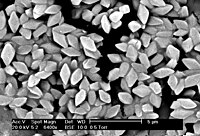
Photo from wikipedia
The rising demand for agricultural commodities in developing countries has put increasing pressure on land resources for higher yields, with associated growth in the demand for phosphate fertilizers. However, there… Click to show full abstract
The rising demand for agricultural commodities in developing countries has put increasing pressure on land resources for higher yields, with associated growth in the demand for phosphate fertilizers. However, there are a number of adverse environmental impacts associated with the use of inorganic P fertilizers that is pushing global fertilizer prices up. In this context, phosphate solubilizing microorganisms, such as Bacillus , are the most eco-friendly and inexpensive option for enhancing P availability for plants, once they are capable of transforming insoluble P into soluble (plant accessible) forms and are regarded as plant growth - promoting microorganisms. This work aimed to understand the effect of tropical Bacillus strains on maize root morphology and growth using a hydroponic system and to evaluate their performance under two phosphorus fertilization conditions in the field. Maize root was inoculated separately with six Bacillus strains and grown in nutrient solution. Several root traits, dry weight and nutrient content were measured in maize seedlings. Moreover, we measured bacterial IAA-like molecules in vitro production and evaluated inoculated maize performance under field conditions with no P added (P0) and triple superphosphate (TSP) soil fertilization. All the Bacillus strains increased shoot and total dry weight and strains B2084, B119 and B32 had the greatest performance, producing the highest biomass, shoot nutrient content and root surface area compared to other strains in hydroponics. All strains that produced IAA-like molecules demonstrated a positive effect on plant growth by stimulating root elongation. In the field experiments, strain B116 inoculation increased maize yield and P grain accumulation by around 36% and 58%, respectively, and B119 increased P grain in 21% in soils with no P added. Even in soils fertilized with TSP, maize yield increase and P grain accumulation was around 20% after inoculation with these two strains comparing to non-inoculated control. Our results indicated that maize plants inoculated with Bacillus strains capable of producing IAA-like molecules and solubilizing phosphate, presented enhanced root system, dry matter and nutrient accumulation in hydroponics and higher yield and grain P content with and without addition of phosphate fertilizer under field conditions.
Journal Title: Journal of Plant Growth Regulation
Year Published: 2020
Link to full text (if available)
Share on Social Media: Sign Up to like & get
recommendations!